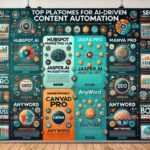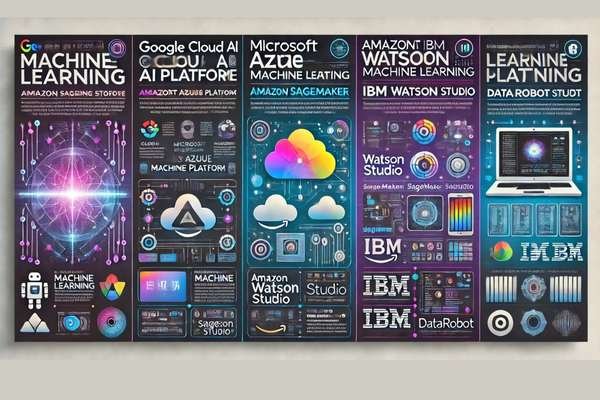
Top AI Tools to Boost Your Content Strategy
November 14, 2024
Top Platforms for AI-Driven Content Automation
November 14, 2024AI Platforms to Automate Content Creation in 2025: AI platforms for content creation have gained momentum, enabling digital professionals to automate and optimize their workflows. By leveraging AI, marketers can generate high-quality content, enhance productivity, and make data-driven decisions with ease. As we head into 2025, these platforms are more powerful, accessible, and transformative than ever before.
Table of Contents
AI Writing Assistants and Content Generators
Jasper AI
Jasper AI remains a leader in content generation, allowing users to create blog posts, social media content, product descriptions, and more. It offers features like content templates and tone customization, making it ideal for a variety of content types.
Key Features:
- Templates for various content types
- SEO tools to help with search engine optimization
- Team collaboration options for better workflow
Copy.ai
Copy.ai focuses on generating short-form content such as social media posts, product descriptions, and ad copy. With its user-friendly interface, Copy.ai makes it easy for marketers to produce high-quality, engaging content.
Key Features:
- Pre-designed templates for different needs
- Intuitive interface for quick navigation
- Multi-language support for global reach
SEO-Driven Content Optimization Tools
Surfer SEO
Surfer SEO combines AI and SEO to enhance content ranking by analyzing competitors and offering content structure recommendations.
Key Features:
- Content structure and SEO suggestions
- Competitor analysis for keyword research
- On-page optimization recommendations
Clearscope
Clearscope offers content briefs that guide users to create SEO-optimized content. It provides keyword suggestions based on top-ranking content and relevance scores to ensure the best possible outcome for organic reach.
Key Features:
- SEO-focused content briefs
- Keyword relevance scoring
- Topic recommendations based on search trends
AI-Powered Data Analysis and Insights
Google Analytics with AI Insights
Google Analytics continues to integrate AI-powered insights, such as predictive metrics, that allow users to understand audience behavior more effectively.
Key Features:
- Predictive analytics for user trends
- Custom reports tailored to user needs
- Real-time data insights for agile strategy
Tableau
Tableau’s AI capabilities, especially in natural language processing, make it easier for marketers to analyze and visualize complex data.
Key Features:
- Advanced data visualizations
- NLP-based data querying
- Integration with major data sources
Personalization and Engagement Tools
HubSpot’s AI CRM
HubSpot’s AI-powered CRM enables companies to enhance customer interactions with personalized communications and automated outreach.
Key Features:
- Customer segmentation for targeted marketing
- Automated follow-ups and response systems
- Detailed customer insights for effective engagement
Persado
Persado’s AI platform specializes in crafting persuasive, emotion-driven messages. It analyzes language patterns and offers message variations that drive higher engagement rates.
Key Features:
- Emotion analysis for messaging
- Performance tracking of message variants
- Content recommendations based on past success
Visual Content Creation and Enhancement Tools
Canva’s AI Tools
Canva’s AI-powered tools simplify graphic design, allowing users to create high-quality visuals without requiring advanced design skills.
Key Features:
- Image enhancement and editing tools
- Templates for social media and other platforms
- Design suggestions based on AI analysis
Lumen5
Lumen5 is an AI video generator that allows users to convert blog posts or articles into engaging videos, ideal for expanding reach through video marketing.
Key Features:
- Text-to-video conversion
- Customizable video templates
- Automated video suggestions
Content Curation and Distribution Tools
Curata
Curata’s AI-driven content curation platform helps marketers keep their audiences engaged by suggesting relevant content for social media and blogs.
Key Features:
- Automatic content discovery
- Scheduled distribution across platforms
- Analytics for engagement tracking
BuzzSumo
BuzzSumo’s content discovery tools enable marketers to identify trending content, making it easy to create posts with high engagement potential.
Key Features:
- Content trend analysis
- Social engagement tracking
- Influencer identification
AI Platforms to Automate Content Creation in 2025 recap
| Platform | Key Features | Best For | Learn More |
|---|---|---|---|
| Jasper AI |
| High-quality long-form content creation. | Visit Jasper AI |
| Surfer SEO |
| Boosting organic content rankings. | Visit Surfer SEO |
| HubSpot’s AI CRM |
| Personalized marketing and customer engagement. | Visit HubSpot |
| Clearscope |
| Creating SEO-optimized content briefs. | Visit Clearscope |
| Canva’s AI Tools |
| Graphic design for non-designers. | Visit Canva |
| Lumen5 |
| Video marketing and repurposing written content. | Visit Lumen5 |
Frequently Asked Questions
What are the best AI tools for automating content creation in 2025?
AI tools like Jasper, Surfer SEO, and HubSpot’s AI CRM are among the most effective for content automation. Each platform offers unique features tailored to different aspects of content creation, from writing to optimization and distribution.
How does AI impact SEO content strategies?
AI-driven SEO tools like Surfer SEO and Clearscope analyze top-ranking content and suggest improvements, enhancing organic reach and ranking potential. These tools streamline SEO efforts by providing data-driven recommendations for structure, keywords, and readability.
Are AI-generated content tools replacing human content creators?
AI tools are designed to support human creators, not replace them. While AI can streamline content creation and automate repetitive tasks, human creativity and insight remain crucial for producing meaningful, authentic content.
Conclusion
AI platforms for content creation in 2025 offer powerful solutions for digital marketing professionals, developers, and content creators. By integrating these tools into their workflows, teams can create, optimize, and distribute content with greater efficiency and precision.








